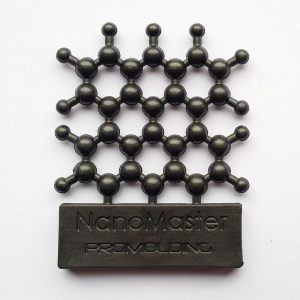Objective of the project:
Reduce the amount of polymers that is needed for the production of a polymer part.
The aims of Nanomaster are to reduce the amount of plastic use to make a component by 50 % and hence reduce component weight by 50 % at the same time as imparting electrical and thermal functionality.
This will be achieved by developing the next generation of graphene-reinforced nanocomposites.
The aim of this project is to develop the knowledge-based processing methods required to up-scale the production of graphene and expanded graphite reinforced thermoplastic masterbatches and compounds which can be integrated into current conventional and additive manufacturing processes.
Methodology
Graphene reinforced polymers have been shown to exhibit superior mechanical properties over unreinforced polymers. It has been shown that very low loadings of graphene can improve both strength and stiffness whilst providing thermal and electrical conductivity. However, graphene remains prohibitively expensive for large-scale use as a composite reinforcement and to the present there is no company in Europe able to produce graphene thermoplastics masterbatches, as there is not enough understanding of the processing or applications of graphene reinforced thermoplastics or of health and safety issues.
The work will focus on developing processes for large scale rapid production of graphene, expanded graphite and nanographite, machinery and processing methods designed for efficient high throughput production of masterbatches and compounds and developing materials systems which can be integrated into conventional and additive manufacturing processes including Fused Deposition Moulding and Selective Laser Sintering. Applications can be found in sensors, heat exchangers, shielded housings for electronics and heat dissipation for electronics such as LED’s.
Duration of the project
The Nanomaster project started on December 2011 and finished at the end of November 2015.
Link to the website:
http://www.nanomasterproject.eu


